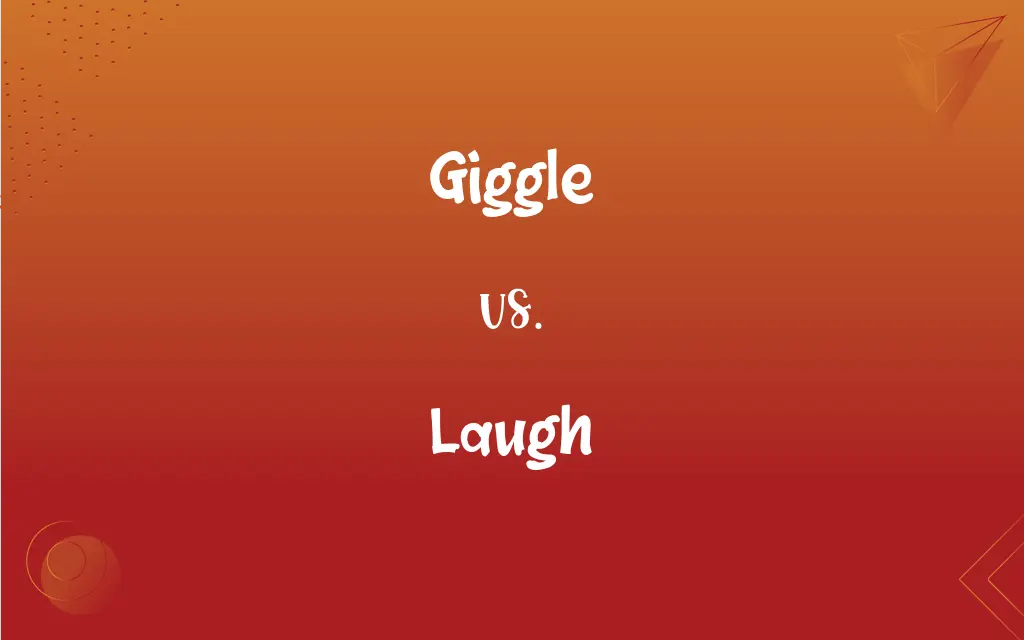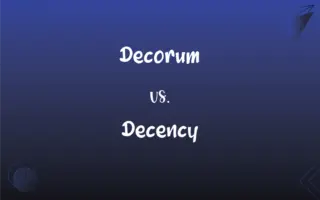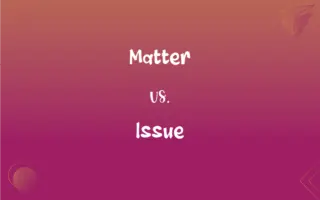Giggle vs. Laugh: What's the Difference?
Edited by Janet White || By Harlon Moss || Updated on November 7, 2023
A giggle is a light, often suppressed laugh, typically indicating amusement, while a laugh is a louder, more open expression of humor or joy.

Key Differences
Giggling is a soft, somewhat suppressed form of laughter that is usually a response to mild amusement or nervousness. Laughing, on the other hand, is a louder, more pronounced reaction that often signifies greater amusement, joy, or even sometimes discomfort.
A giggle is characterized by its quiet, light-hearted nature, often occurring in short bursts. It's usually more controlled and less spontaneous than a laugh, which can be loud, robust, and hearty, echoing a strong sense of humor or reaction to comedy.
While giggles may be shared in a secretive or flirtatious manner among friends, laughter is a universal response that can be understood across various languages and cultures, often shared openly in social settings.
The act of giggling can be involuntary but is often contained, reflecting a polite or restrained reaction to amusement. Laughing, conversely, may range from a gentle chuckle to an uncontrollable guffaw, showing a wide spectrum of emotional expression.
Giggles can be discreet and signify private amusement, whereas laughs are communicative and can serve to connect people, sometimes even contagious in groups, leading to a shared experience of joy.
ADVERTISEMENT
Comparison Chart
Sound
Light, quiet, and high-pitched.
Louder, deeper, and more varied in tone.
Expression of
Mild amusement, sometimes nervousness or shyness.
Stronger amusement, joy, or other emotions.
Control
More controlled and can be suppressed.
More spontaneous and harder to suppress.
Social Context
Often private or intimate settings.
Any social setting, more openly expressive.
Physical Response
Subtle, may not involve full body movement.
Can involve shaking or crying from intensity.
ADVERTISEMENT
Giggle and Laugh Definitions
Giggle
A light, silly laugh.
She let out a giggle at the whimsical cartoon.
Laugh
To express mirth or joy with vocal sounds.
He laughed heartily at the comedian's joke.
Giggle
A nervous laugh.
A giggle escaped her lips as she stepped onto the stage.
Laugh
A hearty vocal expression of amusement.
Her laugh was so infectious, everyone else joined in.
Giggle
A quiet titter of amusement.
His whispered joke made her giggle during the meeting.
Laugh
To make sounds signifying amusement or derision.
They all laughed when he slipped, but he wasn't hurt.
Giggle
An act of laughing lightly and in a high-pitched manner.
The children's giggle filled the room as they played hide and seek.
Laugh
An act of laughing.
His joke received a loud laugh from the audience.
Giggle
To laugh in a silly, often subdued way.
They giggled at the memory of their earlier mishap.
Laugh
To react to something with a loud or hearty vocal sound.
She laughed at the idea that she had ever been afraid of dogs.
Giggle
To laugh with repeated short, spasmodic sounds.
Laugh
To express certain emotions, especially mirth or delight, by a series of spontaneous, usually unarticulated sounds often accompanied by corresponding facial and bodily movements.
Giggle
To utter while giggling.
Laugh
To show or feel amusement or good humor
An experience we would laugh about later on.
FAQs
What is a giggle?
A giggle is a light, often high-pitched laugh that is usually quiet and controlled.
Is a giggle always happy?
Not necessarily; giggles can also come from nervousness or discomfort.
Why do people giggle?
People giggle in response to mild humor, awkwardness, or out of habit.
What is a laugh?
A laugh is a vocal expression ranging from a light chuckle to a loud guffaw, signifying amusement.
Can laughter be negative?
Yes, laughter can sometimes be derisive or sarcastic.
What causes laughter?
Laughter is caused by amusement, joy, or sometimes as a social response.
Are giggles contagious?
Giggles can be contagious, especially in close groups.
Do all cultures laugh the same way?
The act of laughing is universal, but the triggers for laughter can vary by culture.
Can giggling be inappropriate?
Yes, giggling at the wrong time can be seen as impolite or insensitive.
What is the "last laugh"?
It's an expression meaning the ultimate victory or success, despite setbacks.
How is laughter used in therapy?
Laughter therapy uses the act of laughing to improve mental and emotional health.
Can you fake a giggle?
Yes, people can fake a giggle, often to seem polite or join in socially.
Is it possible to giggle without smiling?
It's possible, as giggling can be a nervous reaction not always associated with happiness.
Can you control a giggle?
While it's possible to suppress a giggle, it can be difficult when you're highly amused or nervous.
What does "laugh off" mean?
It means to dismiss something by laughing, showing you're not affected by it.
Are there different types of laughs?
Yes, there are many types, from chuckles to belly laughs to snickers.
Is laughter healthy?
Yes, laughter has been shown to reduce stress and improve overall health.
Can animals giggle?
Some animals make sounds that are similar to giggling, often during play.
Do infants giggle?
Yes, infants can giggle, usually starting around 3 to 4 months of age.
What is a "laugh track"?
It's a pre-recorded laughter added to TV shows to cue the audience to the humor.
About Author
Written by
Harlon MossHarlon is a seasoned quality moderator and accomplished content writer for Difference Wiki. An alumnus of the prestigious University of California, he earned his degree in Computer Science. Leveraging his academic background, Harlon brings a meticulous and informed perspective to his work, ensuring content accuracy and excellence.
Edited by
Janet WhiteJanet White has been an esteemed writer and blogger for Difference Wiki. Holding a Master's degree in Science and Medical Journalism from the prestigious Boston University, she has consistently demonstrated her expertise and passion for her field. When she's not immersed in her work, Janet relishes her time exercising, delving into a good book, and cherishing moments with friends and family.































































